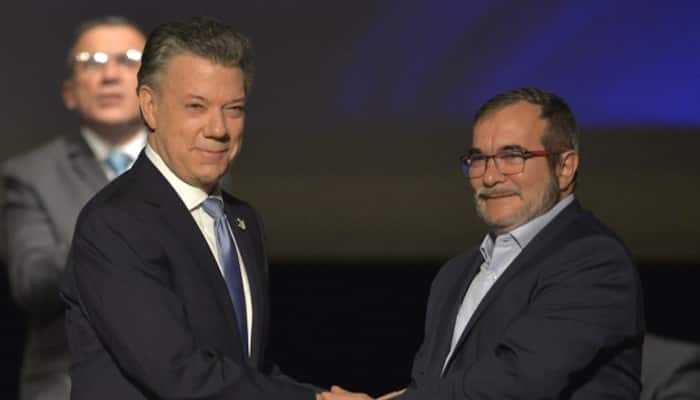The Colombian government and the leftist Farc rebels in 2016 signed a historic peace deal to cease hostilities which had plagued the Andean nation for several decades. The move signalled a break from the past when both sides looked at each other with trepidation and attempts to broker peace met with stiff resistance.
For the first time, Colombians from both sides of the political divide believed they have a chance and in fact on the cusp of a lasting peace. However, fears over the accord's delayed execution which could scuttle the peace initiative remained.
President Juan Manuel Santos expressed this concern when he had said the attacks on civilians are a testimony to the risks of not implementing it.
To bring this historic accord to fruition, both sides had announced a ceasefire deal that came into effect on September 29. In 2015, FARC had declared a unilateral ceasefire but this was the first time that both sides had committed to it.
Colombian government, Farc rebels sign revised peace deal
On November 24, the Colombian government and the Revolutionary Armed Forces of Colombia signed a revised peace agreement to end the country's more than five decades long civil war, which left over 200,000 people dead.
The deal was signed by President Juan Manuel Santos and Farc leader Rodrigo Londono after nearly four years of negotiations. President Santos, who was honoured with the 2016 Nobel peace prize for his conciliatory efforts, hailed the agreement as the “real deal”. While Farc leader Londono hoped the deal would enable Colombians “to confront the differences in a civilised manner”.
The modified document was a rework on at least 50 key points. The accord followed a nationwide referendum in October in which the country had rejected an earlier agreement reached in September. Majority of the voters were of the view that it gave more "leniency” to FARC fighters accused of war crimes.
The signing ceremony of the revised deal was hence deliberately kept a low-key affair compared to the previous one signed on September 26.
Voters reject peace deal in October referendum
The landmark peace deal reached between the Colombian government and Farc rebels in September was rejected by voters in an October 2 referendum.
Opponents of the accord punched several holes in the deal by pointing out many “unresolved points”. A total of 50.2% of voters said 'NO' to the deal while the remaining said “Yes”. Besides President Santos, many world leaders, including UN Secretary General Ban Ki-moon, backed the "yes" campaign.
The votes were clearly divided with the outer provinces voting in favour and those in inland voting against it. Provinces that are hardest hit by the conflict, overwhelmingly supported the deal. While those opposing it, said it gave more leeway to rebels accused of murder and other heinous crimes.
Others have resented the fact that the agreement warranted 10 seats in the Colombian Congress in 2018 and 2022 elections to the Farc rebels.
Colombian government, Farc rebels ink first agreement
The Colombian government and the Farc rebels signed the first peace deal in the colonial city of Cartagena on September 26.
The accord was inked before an array of world leaders in a televised ceremony, with hundreds of people in attendance.
The audience greeted by cheers and applause when Farc leader Timoleon Jimenez apologised to the victims of the conflict. "I would like to ask for forgiveness for all the pain that we have caused during this war."
“What we sign today is a declaration from the Colombian people before the world that we are tired or war......that we don’t accept violence as the means of defending ideas,” President Santos said.
“We will achieve any goal, overcome any hurdle and turn our nation into a country we've always dreamed of - a country in peace," the President said.
Colombian Congress approves peace accord
The Colombian Congress green-lighted the modified accord despite protests from opposition quarters over the limited time they got to review the deal. President Santos’s governing coalition, which controls the Senate and the House of Representatives, voted overwhelmingly for the agreement.
The Congress approved the revised peace accord on November 30.
“By pushing the new deal through Congress, the government bypassed voters this time, who had turned down the accord by a narrow margin on Oct. 2,” the New York Times wrote.
The Farc and the government representatives had first announced the agreement in August 2016 after years of tense talks in Havana. The Congress’s vote ended a bitter contest over the morality of the peace deal decision.
The Colombian civil war
The Revolutionary Armed Forces of Colombia, or Farc, has waged a bitter armed struggle against a succession of Colombian governments since 1964.
The Colombian civil war, considered Latin America's last major armed stand-off, has claimed the lives of at least 200,000 people and displaced millions.
Also, the paramilitary groups raised to counter the Farc rebellion, massacred hundreds of civilians and burned villages at a slightest hint of supporting the rebels. Besides kidnappings and killings for ransom, Farc had also turned to the cocaine trade to finance its insurgency.
After the accord was signed, the Colombian government has ordered its armed forces to halt all military operations against the Farc. While Farc leader Timoleon Jimenez announced in Cuba, "I order all our commanders and units and each one of our combatants to definitively cease fire and hostilities against the Colombian state from midnight tonight (Nov 24).”
















